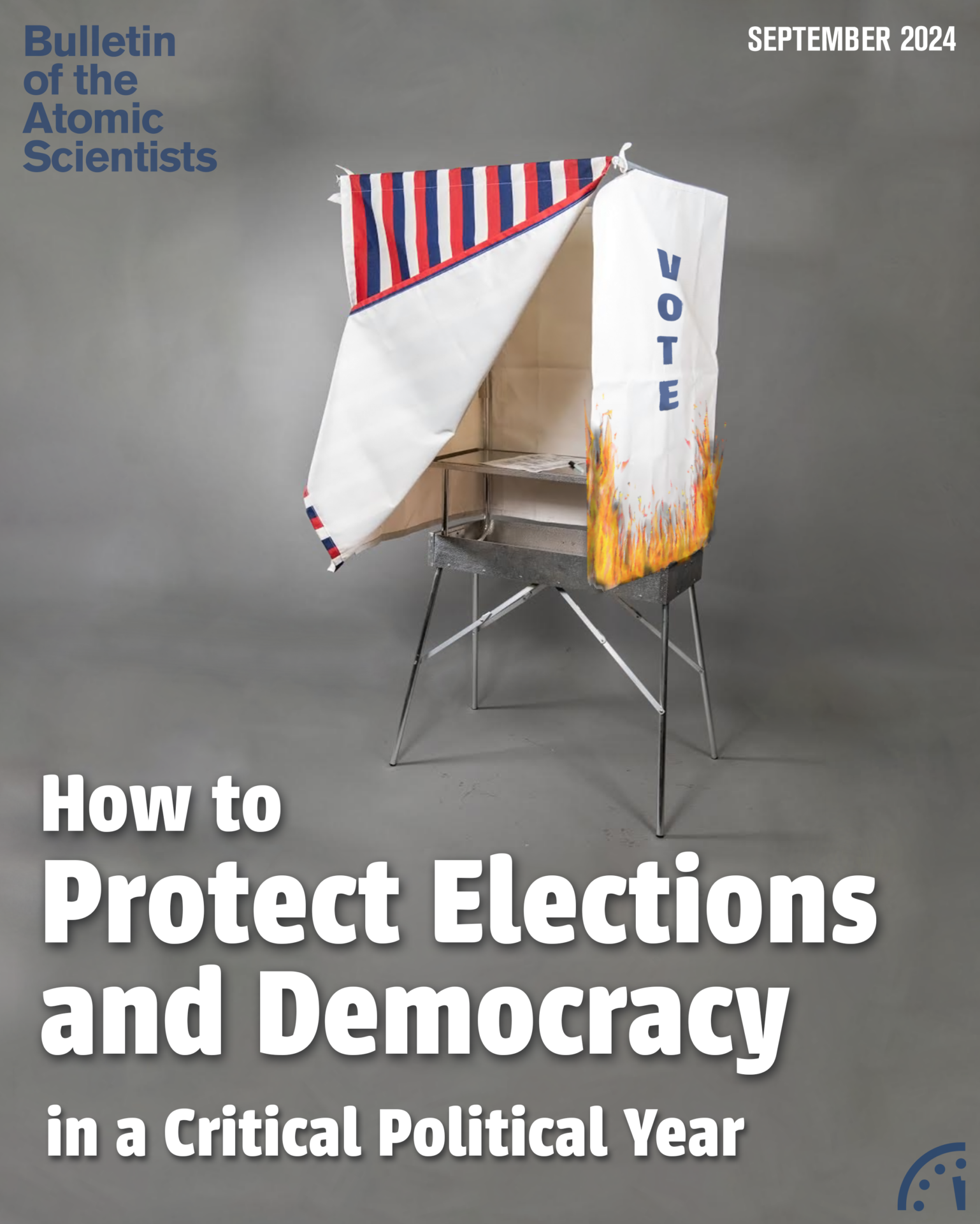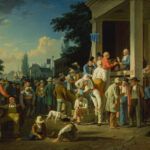Introduction: Securing elections, democracy, and the information ecosystem in a critical political year
By John Mecklin, Dan Drollette Jr | September 5, 2024
Introduction: Securing elections, democracy, and the information ecosystem in a critical political year
By John Mecklin, Dan Drollette Jr | September 5, 2024
On January 6 four years ago, angry supporters of then-President Donald Trump stormed the United States Capitol in an attempt to keep him in office, even though he had lost the 2020 election to Joe Biden. Two years later, supporters of Brazilian President Jair Bolsonaro refused to concede his electoral defeat and called for a military coup: They stormed the presidential palace, broke windows, ransacked the country’s Supreme Court building, and switched on sprinkler systems to flood Brazil’s congressional quarters.
Even though they eventually failed to overturn elections, the events in Brazil and the United States are part of a broader trend, in which so-called populist political campaigns have attempted to move countries around the world—including, in Europe, Italy, France, and Hungary—away from democracy and toward authoritarian or autocratic rule. The challenges to democracy are complex and vary by country. In general, however, those challenges are occurring in a context that involves not just the rise of charismatic political figures espousing anti-democratic ideologies but also efforts to sway elections with sophisticated digital disinformation campaigns that aim to undermine belief in elections. Because representative governance is critical to the reduction of major global risks, this issue of the Bulletin of the Atomic Scientists explores ways that free elections and democracy in general might be preserved and protected.
John Keane of Sydney University is the author of several books on democracy whose interest in the subject goes back to the “flying university” apartment seminars of the 1980s in then-communist Eastern Europe. In his wide-ranging essay, “How demagogues destroy democracy: a step-by-step global guide,” Keane uses current events and ancient history to explain how representative government can be lost, bit by bit. “[W]hile building a democracy is a tough task that can take at least a lifetime,” Keane writes, “its destruction, or ‘democide,’ is much easier and can happen faster.” Keane’s prescription for demagogue and democide control is inspiring and daunting at once: “In our troubled times, what is arguably needed to counter demagoguery is not only more citizen involvement in public life—what has been termed ‘deliberative democracy’—but more robust ways of blocking predatory power, building sharp-toothed watchdog networks and institutions capable of rolling back unaccountable corporate and state power, protecting life on our planet, and generally fostering the spirit of greater social equality among citizens who value free and fair elections, welcome media diversity, and feel utterly comfortable in the company of different others who are not treated as ‘enemies’ but as partners, strangers, competitors, citizens, and friends.”
The United States Constitution is a blueprint for democracy, revered domestically and around the world. But some provisions of that founding document make the United States oddly vulnerable to democratic backsliding. As Amherst College law professor Lawrence Douglas writes in “Constitutional mistakes of the past can tyrannize the present—but we can fix them,” US citizens are far too accepting of the Electoral College, a creation of the Constitution that can allow the loser of the national popular vote to capture the presidency (something that has happened twice since the year 2000). “The United States is alone among the world’s democracies in having a presidential election system that can produce such an outcome,” Douglas writes.
And, he notes, Article V of the Constitution makes it is well-nigh impossible to address this undemocratic possibility, which rears its head in every US election: Two-thirds of the members of both houses of Congress and three-quarters of state legislatures must assent before the Constitution—a document originally drafted in 1787—can be amended. Douglas notes another possible way to right the Electoral College’s anti-democratic tilt: The National Popular Vote Interstate Compact would have member states award all their Electoral College votes to the winner of the national popular vote, rather than have delegates cast votes on a state-by-state basis. If states representing 270 Electoral College votes—the bare majority necessary to elect a president—sign on to the compact, the United States effectively would have a system of a national popular vote. So far, states representing 209 electoral votes have signed on. But even if states with the requisite 270 electoral votes signed on, Douglas writes, “it’s unclear whether the compact would survive the inevitable constitutional challenge.”
Attempts to undermine American democracy have been supported over the last decade by online disinformation campaigns that aim to diminish confidence in elections. In an interview with Bulletin contributing editor Dawn Stover, Lawrence Norden, the director of the Elections & Government Program at New York University’s Brennan Center for Justice, explains how election security can be buttressed by a variety of actions, some as simple and straightforward as paper backups for votes cast and counted in computerized systems. As much as anything, Norden says, election security comes down to fighting electoral disinformation and misinformation—whether it is spread by foreign powers or domestic groups. At its core, that fight involves better public education on how elections work at the nuts-and-bolts level to inoculate citizens against conspiracy theories that undermine confidence in elections.
Merely getting Americans to vote can be hard. As Aidan Calvelli, a Harvard law graduate now working on a politics doctorate at Princeton, writes: “For all their talk of democracy, US voters have some of the lowest turnout rates in the developed world.” One possibility for increasing turnout, used only minimally so far, is an idea that has been kicking around the United States, in one form or another, since the early 1600s: mandatory voting. (Not long after they landed at Plymouth Rock, the Pilgrims passed a law saying that if you didn’t vote, you had to pay a fine.) Calvelli, who previously wrote about the history of compulsory voting in America in the Harvard Law Review, found that nearly half of the original 13 colonies had a proto-form of compulsory voting—and that waves of reform keep bringing the idea back to the fore. In his Bulletin essay, “The path to compulsory voting,” Calvelli argues that “[t]o turn compulsory voting from dream to reality will take a new approach—one based not in abstract appeals to democratic principles but a practical pitch that more voting means more power for everyday people.”
Among the other offerings in our elections and democracy issue are two interviews dealing with different aspects of how technological change has affected elections around the world: A Q&A with Jibran Ilyas, the US-based architect of an unusual and perhaps unprecedented electoral intervention—an AI-generated message from former Pakistani Prime Minister Imran Khan, imprisoned on a variety of controversial charges, to his followers in the waning days of Pakistan’s national elections; and a discussion with Harper Reed, an entrepreneur and innovator best known for his work on Barack Obama’s successful 2012 presidential campaign, where he served as chief technology officer and in many ways ushered in the Tech Age of American politics.
This issue—finalized in early August for publication in the first week of September—is meant to provide context useful in a rapidly changing political environment that has already seen, just in the United States, an attempted assassination of a major presidential candidate and the withdrawal of a sitting president from his re-election campaign at an extraordinarily late date. Unexpected events will continue to occur as the US presidential election and other political contests transpire around the world. We will cover those events, as relevant to our mission, in real time on our open website. But those events will take place in a landscape full of threats to many of the world’s democracies. Our hope is that this issue helps citizens and their public officials reduce those threats and preserve representative governance.
Together, we make the world safer.
The Bulletin elevates expert voices above the noise. But as an independent nonprofit organization, our operations depend on the support of readers like you. Help us continue to deliver quality journalism that holds leaders accountable. Your support of our work at any level is important. In return, we promise our coverage will be understandable, influential, vigilant, solution-oriented, and fair-minded. Together we can make a difference.
Keywords: 2024 election, AI, Disinformation, anti-vax, climate change, covid, democracy, election 2024, election security, journalism, misinformation, policy making, politics, rule of law, technology, vaccines, voting
Topics: Special Topics




















Yes, something needs to be done about the electoral college. Requiring everyone to vote sounds rather draconian for a free society. Has anyone heard about people living in occupied territories of Ukraine being required to vote in Russian elections? Most American voters feel they are not being heard by their elected representatives. Most respond by voting for “the lesser of two evils” or not voting at all. Perhaps what is really needed is to level the playing field and give third parties an equal chance to compete against the duopoly running the whole process. The Democrat and Republican parties have… Read more »